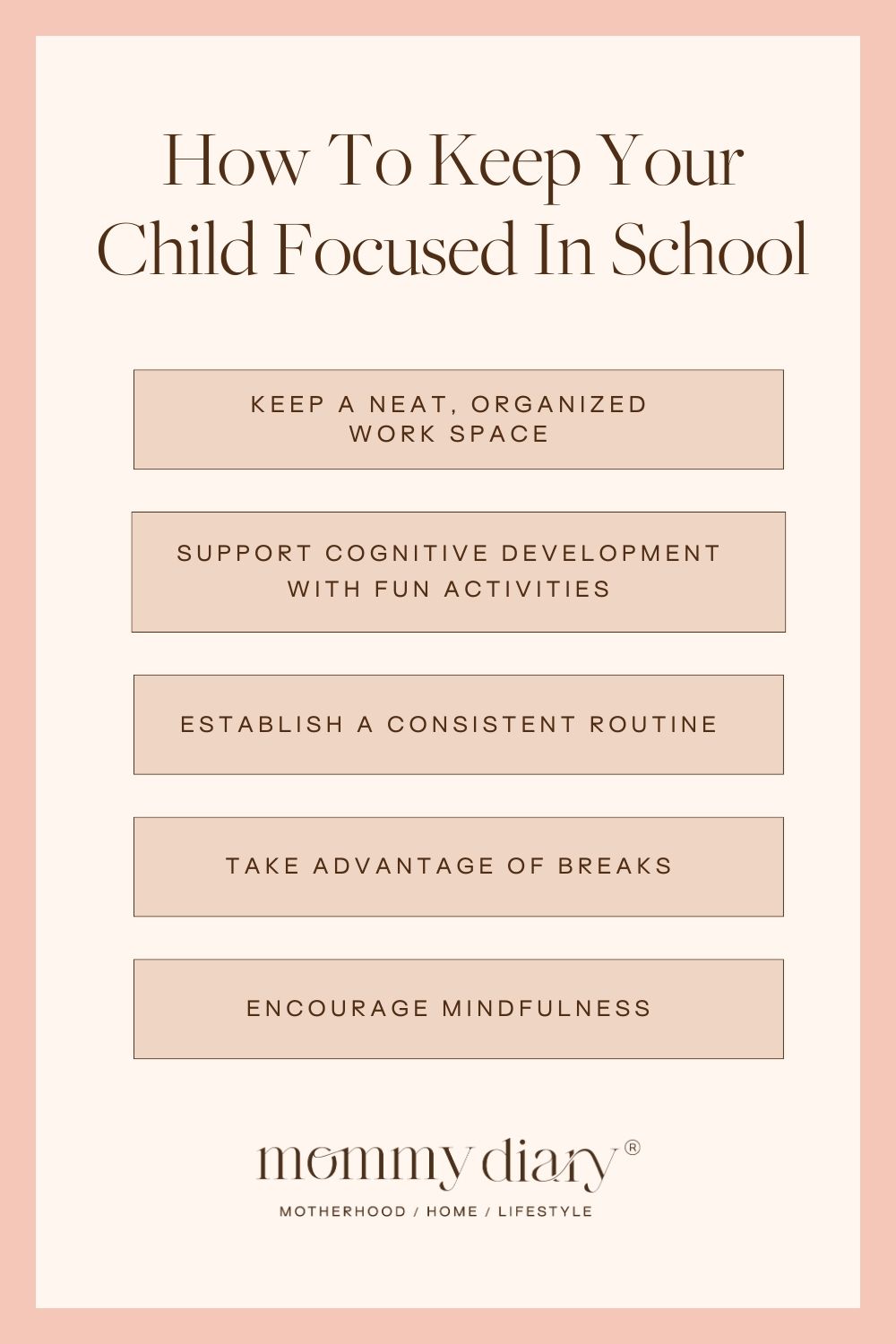Distraction and lack of focus are common among kids. A child’s attention span is naturally shorter compared to adults. As a parent, I know first-hand just how limited a child’s focus can be. It’s understandable, then, that many children find it challenging to focus in school. Kids are often easily distracted by other things that they find more interesting.
Concentration and focus are learned skills. Parents can help their kids learn effective strategies and practices that improve their ability to focus and pay attention in class, as well as in homeschool. With that in mind, I want to share some proven ways that you can help your child stay focused in school.
I’ve already begun to see how these tips have helped my kids’ ability to stay focused! For more on this topic, I talk about how we strive to shift our mindset about school at home, in this episode of my podcast!

How To Keep Your Child Focused In School
Start the day with a balanced breakfast
As they say, breakfast is the most important meal of the day. This is especially true when it comes to children. Research shows that children who eat a healthy, balanced breakfast have improved focus, productivity, and cognition throughout the day. Even more, studies show that families who enjoy more meals together experience even more benefits, such as increased self-esteem and a more positive outlook on life.
With that in mind, make sure you send your kiddos off with full bellies and full hearts – even if it’s just to the next room to homeschool. If you don’t have much time in the mornings for breakfast, try my easy chia seed and walnut overnight oats!
Prepare for the day ahead
To maintain focus throughout the day, children need adequate preparation. You can help by ensuring they are dressed appropriately for the weather, have all necessary school and sports supplies, and have a healthy lunch to look forward to. Additionally, make sure all homework is complete, permission slips are signed, and sports games, concert recitals, and other events are scheduled.
To ensure I’m not running around all morning, I like to get everything squared away the night before during my evening routine. This also gives me plenty of time to spend with my children in the morning before the day begins – a time I truly cherish!
Focus on one thing at a time
For most kids, multitasking is counterproductive. Some research suggests that multitasking is bad for kids. The idea is that multitasking makes it difficult for children to properly absorb information and connect thoughts and ideas, especially in young children whose brain is still developing.
I’ve found that it’s better to teach your child to focus on one thing at a time. A child is much more likely to be productive when they focus only on the task at hand.
Break it down
Sometimes a child will lose focus because they’re overwhelmed by the big picture. If this is the issue, one effective solution is to break it down into smaller, more manageable tasks.
Trying to take on too much at one time often results in a lack of focus and distraction. Breaking things down gives your child a clear idea of what they need to do, and a greater sense of accomplishment once each task is complete.

Keep a neat, organized workspace
Many kids have trouble focusing because of a disorganized or cluttered workspace. Think about how distracting clutter and disorganization are in your own life, then consider your child’s thoughts and feelings.
A workspace that is clear of clutter and contains only the items your child needs for their assignments can significantly improve focus in the classroom. Teach them the importance of keeping their space organized, both at home and at school, to make paying attention much easier.
Support cognitive development with fun activities
Especially among preschoolers and young learners, play is important for a child’s cognitive development. Cognitive development is a blanket term that refers to your child using their brain to think, communicate, understand, remember, imagine, and learn. Important cognitive skills include the ability to retain information, problem-solve, find reason, and hold attention.
Young children learn best through play. You can help them to develop important cognitive skills with fun, stimulating activities. And don’t worry, video games aren’t the only way to keep your child entertained during play! There are plenty of screen-free activities to support cognitive development at home.
Establish a consistent routine
Many children benefit from having a set routine that they can stick to. You can work with your child to create a routine that will help them accomplish tasks throughout the day. A child’s daily schedule usually includes time for activities, as well as homework, studying, and family time.
Creating and sticking to a routine means your child knows what to expect. Especially for older children, a routine allows them to plan accordingly so that they can make the most of the time they have for each activity.
Take advantage of breaks
When you create a routine for your child, don’t forget to include breaks. Breaks from school work, homework, studying, and chores are important because they give your child an opportunity to recharge.
Encourage your children to take advantage of their breaks. If you can, get your kids to spend some time outside so they can release built-up tension and energy. Then, once their break is over, they’re better able to sit still and refocus on their work.
Encourage mindfulness
Mindfulness practice is not just limited to adults (although it’s an important part of my Sunday Reset Routine)! Mindfulness means focusing on the present moment and your current thoughts and feelings. It’s a practice that can benefit both adults and children alike!
You can encourage your child to practice mindfulness whenever they become distracted. Remind them to sit quietly, take deep breaths, and take a moment to center themselves. This will help them refocus on tasks that require their attention.

Making a few simple changes at home can make a huge difference for children who are struggling to stay focused in school.
If your child is having a hard time staying focused in the classroom throughout the school year, you’re not alone. This is a common problem for parents, myself included. Fortunately, by making just a few simple changes at home, you can see a significant difference in your child’s ability to focus at school.
You can find even more parenting advice, as well as helpful tips and tricks, on my blog, my Instagram, and my podcast.

